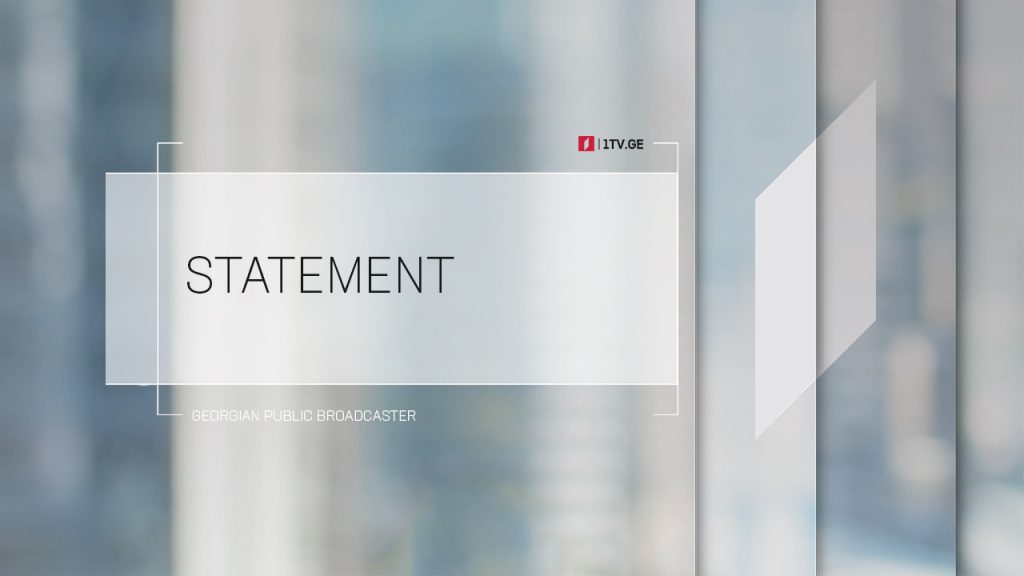
The Georgian Public Broadcaster states that the analysis prepared by the Charter of Journalistic Ethics does not meet the standard of impartial and objective research.
The Georgian Public Broadcaster responds to recent reports published in the Research of Media Coverage of the 2020 Parliamentary Elections in Georgia, stating that the analysis prepared by the Charter of Journalistic Ethics still does not meet the standard of impartial and objective research.
The TV News Monitoring Report presents incorrect factual data on the quantitative and qualitative components of the First Channel TV products.
In the two news programs of the First Channel Moambe 21:00 and Akhali Kvira, the coverage time of the Georgian Dream party (07:45:19), as measured by the Charter of Journalistic Ethics, does not correspond to reality. According to the internal monitoring data of the Public Broadcaster, the duration of coverage of the Georgian Dream in the same programs during the period indicated in the report was much shorter (05:43:53). This error in the report significantly alters and makes the main findings of the study unreliable.
The broadcaster strongly disagrees with the assessment of the February 18 broadcast in the qualitative part of the report. The Charter of Journalistic Ethics believes that “a positive attitude towards the ruling party was manifested in the coverage of Giorgi Gakharia’s resignation in Moambe”, which, in their opinion, was expressed by choosing in Irakli Gharibashvili’s nomination as Prime Minister for the first story of the News program. The broadcaster believes that focusing on the sequence of stories, in this case, is irrelevant because it was a special issue of Moambe that for 2 hours and 30 minutes in a complex manner and with the involvement of all parties considered only the nomination of Irakli Gharibashvili as Prime Minister and the resignation of Giorgi Gakharia. It seems that the monitors of the Charter of Journalistic Ethics have not seen the program, otherwise they could not have ignored the fact that the presenter of the program managed to maintain impartiality and deliver information to the viewer through clarifying questions in the face of psychological pressure from representatives of both government and opposition political parties.
The report also states: “Although Moambe is constantly trying to portray the diversity of parties in its stories, the biased attitude of individual journalists towards the political process is sometimes noticeable.” As an example of this, not several journalists’ stories, but the stories of only one journalist of Moambe are cited, to which the essential volume of the qualitative part of the research is devoted and instead of the bias of the author of the stories, it reflects the interpretation of the material. It should be noted that the discussion of quantitative and qualitative components, without understanding their interrelationships, is a research shortcoming and the examples given do not provide a solid basis for generalized conclusions.
The accusation of concealing the information mentioned in the report is categorically unacceptable for the broadcaster. The fact of the attack on journalist Vakho Sanaia was covered in several news programs of the First Channel, including the coverage of this fact at 21:00 in Moambe on February 26 for 04:20 minutes, and Moambe at 12:00 after 21 mins from the start also broadcasted a rally of solidarity held by journalists in Batumi.
In conditions of political and media polarization, it is fundamentally important for the Broadcaster to establish the standards of constructive journalism, which really creates an opportunity to present the opposing parties in one space. An example of this is the First Channel talk show Free Vision which is the precedent of the debate in the current media environment. Unfortunately, in the Charter reports, including the TV talk show reports, this important achievement of the Broadcaster was left without proper evaluation, while the steps towards constructive journalism were perceived as a lack of criticism and loyalty to the governing team.
The Public Broadcaster has repeatedly come up with an initiative to develop a media monitoring methodology. To ensure credibility, the Broadcaster also expressed its readiness to make detailed comparisons of internal monitoring data with Charter research data. International research donors are informed about this. The Broadcaster hopes their response will promote media monitoring to a high standard in the future.
By - Svetlana Alimova






